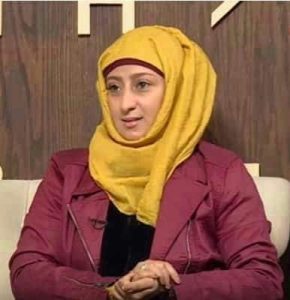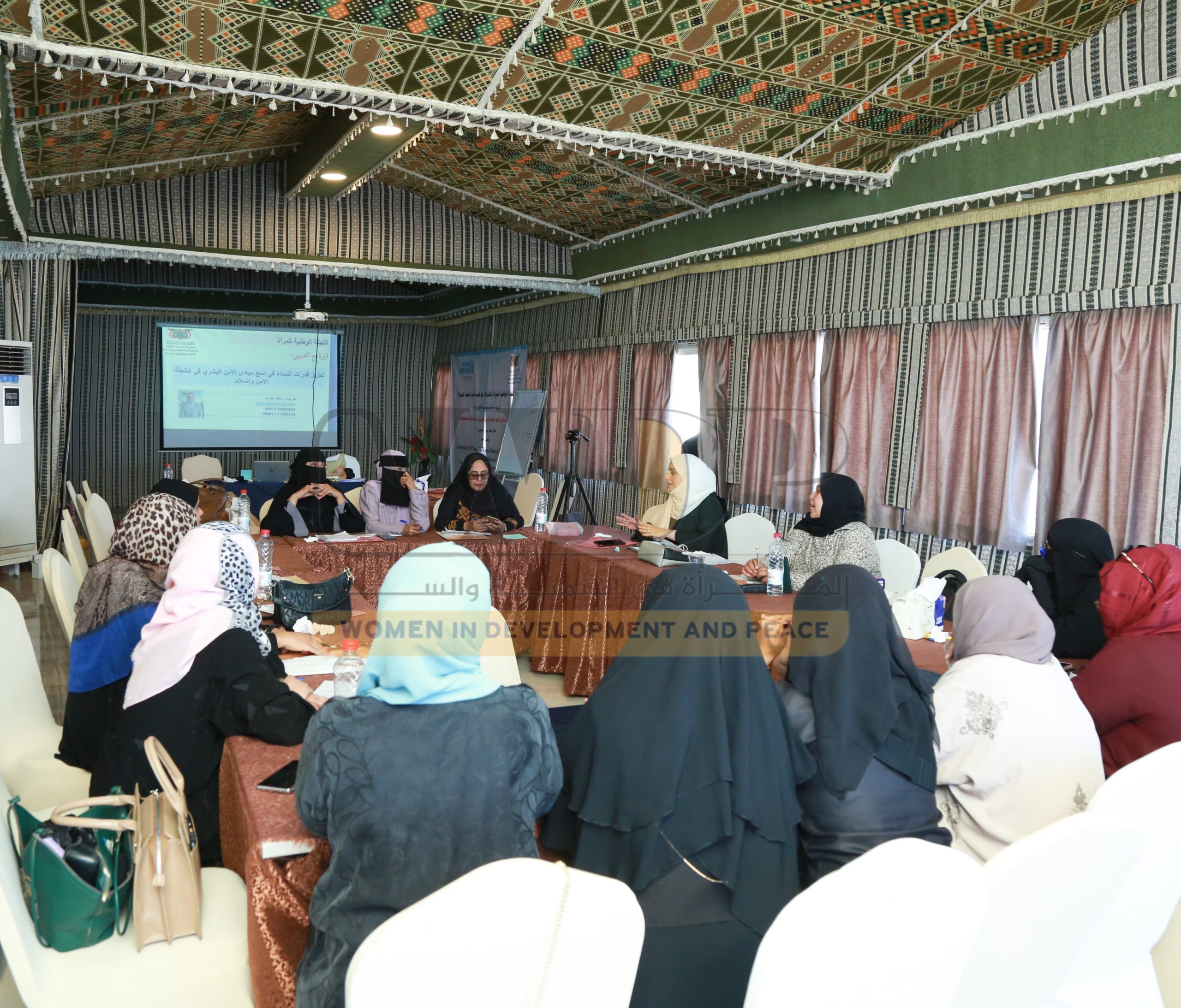Women in Development and Peace – Yasmine Abdulhafeez
Yemeni women have worked hard for decades to reach prestigious and influential leadership positions in decision-making circles, facing all societal and political challenges. They have been appointed as directors, undersecretaries, deputies, ministers, and even ambassadors, who in turn have achieved tangible successes and achievements on the ground in various fields, proving the importance of enhancing the role of women leaders in Yemen and encouraging women to enter this arena, which has been dominated by men.
Despite many challenges facing Yemeni women as a result of the multiple conflicts in Yemen, they have proven their worth in diplomatic work and played an important role in serving their country. Perhaps the most prominent Yemeni female diplomatic figures working in various political, economic, and cultural fields in the diplomatic corps are Amat Al-Aleem Al-Soswa, Ramzia Abbas Muhammad Al-Ariani, Jamila Ali Raga, Mervat Mojali, Sahar Ghanim, Khadiga Al-Sallami, Maha Al-Buraihi, and other women who have played a distinguished role in the diplomatic field.
All the achievements made by Yemeni women working in the field of diplomatic work in achieving sustainable development and breaking the shackles of marginalization and discrimination against them came after facing many challenges. The most important of these challenges is the continuation of the conflict, which prevented them from fulfilling their ambition to achieve comprehensive development for society, whether inside or outside Yemen.
One of the most prominent effects of the conflict on women’s work in the diplomatic field is the lack of security, which has reduced women’s opportunities to travel to participate in international conferences and events and limited their opportunities to develop their skills and gain experience in the diplomatic field. Internal displacement has also led to the dispersal of families and difficulty in devoting themselves to diplomatic work, in addition to the lack of necessary support from the government and civil society for women to enter the diplomatic corps.
The Conflict & Its Societal Impact
After a journey of struggle, many Yemeni women succeeded in wresting their rights and gained participation in important positions in the state. However, the repercussions of the ongoing conflict since 2015, which destroyed most of the state’s institutions and the lack of security and safety, led to a decline in women’s participation in various fields, including the diplomatic field.
Many women have lost their jobs due to the conflict, and others have been forced to leave work after their salaries were cut off. Some were forced to be internally displaced or to emigrate outside the country in search of safety, in addition to women who preferred to stay at home and not continue working for security reasons and others.
The conflict has marginalized the role of working women in various fields and sectors in Yemen, as appointments in administrative positions have focused on the number of men compared to women, who are often chosen according to specific orientations and with less efficiency and ability to bear responsibility. Many women have also been marginalized in various fields that have been dominated by men, especially leadership positions.
The conflict in Yemen has not only affected women working in the diplomatic corps, but working women in various fields, in general, have been affected, as confirmed by a study issued by Sana’a Center for Strategic Studies entitled: The Impact of War on the Female Workforce, July 2019, which confirmed that working women have been greatly affected by the conflict compared to men and that many women’s projects and companies have closed due to the conflict, which forced many of them to work in fields other than their own to help their families after many men lost their salaries and their sources of income were affected.
Lamis Hasan Al-Hamdi, a lawyer and human rights activist, says: “Yemeni women have suffered from obtaining positions in the diplomatic corps for a long time; Professor Ramzia Al-Ariani struggled to reach a position in the field and, after great difficulty, was able to achieve great success and became a prominent diplomat in the country.”
She added that women’s suffering from non-participation in diplomatic work is not new, but has existed for a long time, but the insistence of many Yemeni women to enter this field has made them enter the diplomatic field and play an important role in this field. Despite the efforts made by Yemeni women to seize their right to obtain positions in the diplomatic corps, they still suffer from marginalization.
Women Far from Decision-Making
The absence of Yemeni women from diplomatic positions is one of the most prominent contradictions in Yemeni society. While women participate effectively in various fields, they are still far from decision-making in the diplomatic field.
Lamis Hasan Al-Hamdi points out that at present, the presence of Yemeni women in the diplomatic corps is limited to one position in a European country, while men dominate other diplomatic positions and are constantly recycled. In contrast, women play many roles at all levels in peacemaking, conflict resolution, and supporting development, which gives them an opportunity for political participation.
 For his part, Jamal Muhammad Al-Ja’abi, Head of Women’s Rights Protection Center, believes that Yemeni women have been able to assert their diplomatic presence remarkably over the past years, and have held the position of ambassador in more than one country, as well as various diplomatic positions. During this time, they have presented distinguished diplomatic performances and have been able to represent the nation in a dignified manner. Although the number of women participating in the diplomatic corps is not large, their impact has been clear and is an achievement in light of these circumstances.
For his part, Jamal Muhammad Al-Ja’abi, Head of Women’s Rights Protection Center, believes that Yemeni women have been able to assert their diplomatic presence remarkably over the past years, and have held the position of ambassador in more than one country, as well as various diplomatic positions. During this time, they have presented distinguished diplomatic performances and have been able to represent the nation in a dignified manner. Although the number of women participating in the diplomatic corps is not large, their impact has been clear and is an achievement in light of these circumstances.
Al-Ja’abi says: “As for the difficulties facing women, they are no different from the challenges facing men, such as the difficulty of adapting to the place where they are appointed, family and children’s arrangements for education, and being away from their local social environment, according to the requirements of travel and movement.”
He stressed that the conflict in Yemen has been reflected in the decline in the level of women’s participation. A culture of diminishing the value of women’s participation has prevailed, not only in the diplomatic corps, but in various social and political fields. Many positions have been monopolized by men, and women have been marginalized in many of them.
Investing in Women’s Competencies
Al-Ja’abi believes that the most prominent challenges facing women working in the diplomatic corps are: confining diplomatic jobs to men, as some of the political forces reject the presence of women in the political arena, especially in diplomacy; not giving women their 30% quota for participation in leadership positions in state institutions, which was agreed upon as part of the outcomes of the national dialogue; and recycling political figures in every change of government, which is one of the most important challenges that does not invest in diverse competencies and experiences, especially women in the diplomatic field.
Al-Ja’abi points to a set of solutions, including raising the capacity of political will to empower women in the diplomatic corps; the commitment of political forces to what they pledged and signed to give women a quota of at least 30%; and not recycling figures in diplomatic positions, in addition to opening up opportunities for women to hold positions in the diplomatic corps.
 For her part, Abeer Muhammad Al-Khadhaf, Editor-in-Chief of Abeer Press website, says: “The role of Yemeni women has become an active part in the national work arena. They have accomplished a lot and struggled to achieve their ambition in the diplomatic corps and have transformed goals into purposeful steps to increase their effective participation in political work, public life, and development building, which has made room for them to occupy leadership positions in the state, including membership in the House of Representatives, the Council of Ministers, the Shura Council, and others.”
For her part, Abeer Muhammad Al-Khadhaf, Editor-in-Chief of Abeer Press website, says: “The role of Yemeni women has become an active part in the national work arena. They have accomplished a lot and struggled to achieve their ambition in the diplomatic corps and have transformed goals into purposeful steps to increase their effective participation in political work, public life, and development building, which has made room for them to occupy leadership positions in the state, including membership in the House of Representatives, the Council of Ministers, the Shura Council, and others.”
She continues by saying: “We, as women, have a deep faith in the role of women, which is no less important than the role of men in bringing about comprehensive development. Women have become prominent in the forefront of national and international concerns, due to their capabilities and abilities that qualify them to occupy the highest levels of responsibility in all political, economic, cultural, and social sectors and fields.”
She added: “Yemen has been suffering from an unstable situation at various levels since 2011, which ended with ongoing conflicts that began in 2015 and continue to this day. Yemeni women also suffer from several issues related to health, education, livelihoods, and political unrest.”
She believes that women’s participation in public life is still limited because they do not get their right to participate in decision-making, and women’s work in public life is still a controversial issue within Yemeni society. She stresses that society has confined women’s participation to specific roles and made their roles secondary, not essential, due to customs and traditions that give dominance to men.
Despite many challenges caused by the conflict, which have helped hinder Yemeni women from reaching leadership positions, they are struggling to obtain their right to be present in all fields, especially the diplomatic corps, to participate in ending the conflict and working to build a better future for Yemen.

